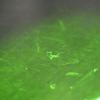Starting from the input beam model described in alog 30126, I expanded the modal model to include the new arm cavities and new SRC.
The optics location data is based on:
- https://galaxy.ligo.caltech.edu/optics/ for optics ROC and glass thicknesses
- E1400205 for BS, ITMX, ITMY, SR3, SR2 and SRM locations (SR2 location moved by 5cm towards the BS compared to E1400205)
While the code is a bit lengthy, it only builds simple structures describing sections of the interferometer:
SRCrt =
lambda: 1.0640e-06
q: -1.8528e+03 + 4.0141e+02i
N: 8
dist: [0 0 24.4907 15.4657 15.7441 15.7441 15.4657 24.4907 0]
ifoc: [-0.0010 -2.3180e-04 0.0555 -0.3113 -0.3522 -0.3113 0.0555 -2.3180e-04]
label: {'ITMback' 'ITMlensr' 'SR3' 'SR2' 'SRM' 'SR2r' 'SR3r' 'ITMlens'}
XARM =
lambda: 1.0640e-06
q: -1.8377e+03 + 4.3420e+02i
N: 2
dist: [3.9945e+03 3.9945e+03 0]
ifoc: [8.9119e-04 0.0010]
label: {'ETMX' 'ITMX'}
YARM =
lambda: 1.0640e-06
q: -1.8356e+03 + 4.3599e+02i
N: 2
dist: [3.9945e+03 3.9945e+03 0]
ifoc: [8.9012e-04 0.0010]
label: {'ETMY' 'ITMY'}
Here the relevant fields are:
q: input beam parameter
N : number of optics
dist : distance between the optics (d/n if in glass, i.e. NOT optical thickness d*n, since this is only for the modal calculation); one more than optics
ifoc : inverse focal length (either 1/f for lenses or 2/R for reflective optics)1 label: label of optics
The cavity overlap in the model is quite good:
Mode-matching of PRC to average arm: 99.9976 %
Mode-matching of PRC to X arm: 99.9988 %
Mode-matching of PRC to Y arm: 99.9959 %
Mode-matching of SRC to PRC: 99.8424 %
Mode-matching of SRC to X arm: 99.8136 %
Mode-matching of SRC to Y arm: 99.7878 %
Contrast defect between x and y arm, incl Schnupp asymmetry, but without reflectivity imbalance: 5.0033e-06
Note that without the 5cm SR2 move that was just completed the SRC looks significantly worse:
Mode-matching of SRC to PRC: 96.8874 %
Mode-matching of SRC to X arm: 96.7677 %
Mode-matching of SRC to Y arm: 96.666 %
The code is located at /ligo/home/controls/sballmer/20171207/beamCalc.m. It uses custom MATLAB libraries in /ligo/home/controls/sballmer/lib. The library includes a number of mode propagation plotting and overlapping tools.
The SR2 was moved by +5mm, see alog 39265.





















